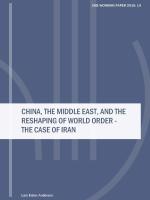Is the Middle East the new battleground in China-US rivalry?
When a US drone was shot down by Iran, Trump called off a military response just ten minutes before it was due to start, while the reaction to the attacks on Saudi Arabian oil installations on September 14, which the US accused Iran of being behind, has been moderate. There were no real threats of military operations. In October, three thousand US troops were deployed to Saudi Arabia, in part a replacement for troops who were sent home on leave. The talk of a US retreat though is misleading as the US still keeps its bases in the Persian Gulf, and has deployed 14,000 troops since spring - with more on way. The signals from the Trump administration – soft reaction to attacks, withdrawal from Syria, deployment of more troops to the Gulf - have left the Arab Gulf states worried: is the US about to change its geo-strategy in the Persian Gulf and leave the Arab Gulf states to defend themselves, or is the US preparing for a war with Iran?
In the years 2014 – 2018, China completed partnership agreements with at least 13 states in the greater Middle East, and has established its first naval base in Djibouti. It is the largest importer of oil from the region, and it has increased economic investment and trade in the three areas of priority outlined in China’s Arab Policy Paper from 2016: (1) energy, (2) infrastructure construction, and (3) nuclear energy, satellites and new energy resources. This raise the question whether China is about to replace the US in the Middle East and thus initiate a China-US rivalry in the region?
DIIS researcher Lars Erslev Andersen analyses this question in his new DIIS Working Paper taking China’s policy towards Iran after the renewed US sanctions following the withdrawal from the Iran nuclear deal from 2015 as a litmus test for China–US relations in the Gulf.The paper concludes that there are not many indications that China is trying to challenge US interests in the region, as China in its economic activities has been freeriding on the security provided by the US for years. Rivalry leading to possible confrontations between the two great powers will thus depend on how the US is conducting its Middle East policy, especially in the Persian Gulf, and how China will cope with these changes.
DIIS Experts


